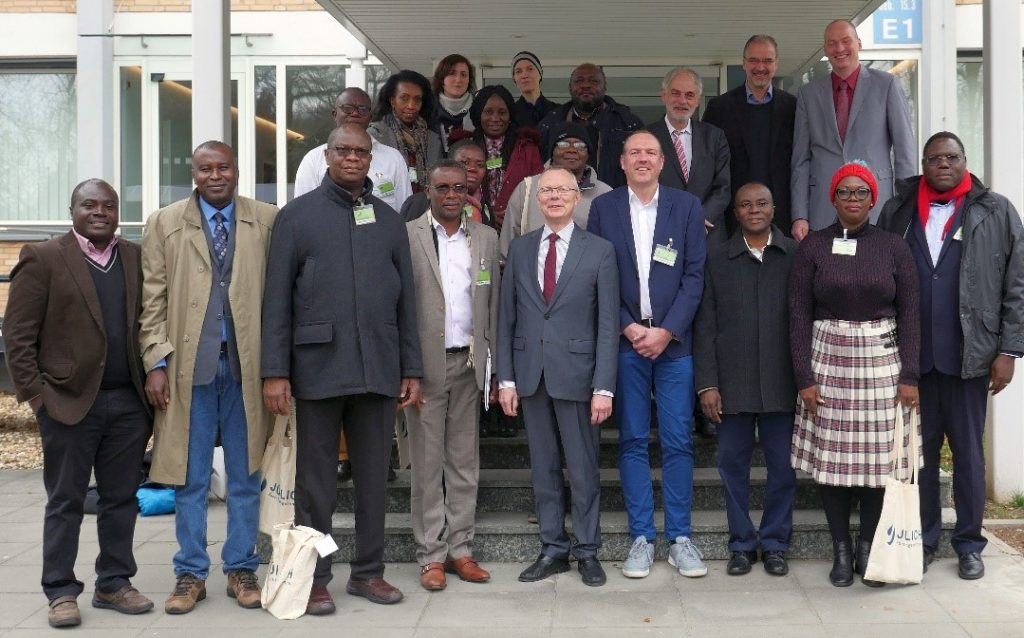Dr Jane Olwoch, SASSCAL Executive Director participated in the tour of Germany’s leading research centres focusing on renewable energy. Under the tagline “Building Bridges – a tour of Germany’s leading research centres”, it took place in late March 2019. As the host, the German Federal Ministry of Education and Research (BMBF) initiated partnerships between numerous German and African scientists, as well as the heads of research institutions from Ghana, Benin, Togo, Nigeria, Niger, Gambia and Namibia, in order to analyse the potential of renewable energy and its prospects of implementation.
“We are here to build bridges between countries, institutions, and people”, explained Dr Christoph Rövekamp from BMBF, at the launch of the Germany tour. “The tour is another platform where the West African Science Service Centre on Climate Change and Adapted Land Use (WASCAL), SASSCAL and German scientists’ interactions and dialogue are strengthened”.

Participants of the “Building Bridges” Tour
The “Building Bridges” Tour provided an excellent opportunity for participants to obtain first-hand experiences on the recent technology and advanced research towards full exploitation of the power of renewable energy. From the geothermal power plant MoNiKa and the bioliq® pilot plant at the Karlsruhe Institute of Technology (KIT), the team made its way to Forschungszentrum Jülich where insights into its research into agrosphere, photovoltaics, and plant sciences were provided. A tour of the Jülich Supercomputing Centre was an eye-opener. In Leipzig, the team visited the German Biomass Research Centre (DBFZ) and a step into a wind turbine in Aachen was nerve-racking to some of us, but worth the experience to those who took the challenge. To crown it all, the team visited the Germany’s largest solar park in Berlin-Neuhardenberg. Dr Olwoch reflected that while still a full time academic at the University of Pretoria, she had a photo of the solar park in Berlin-Neuhardenberg that she shared with her students, but “seeing” it and having an opportunity to actually stand there was “believing” that renewable energy and in particular solar has a central place to play in the energy of the future.
Despite all this, most of the world’s energy is still produced by using fossil fuels, including coal, natural gas and oil. While fossil fuels have been a dependable source of energy, they also contribute immensely to greenhouse gas emissions. Yet, a recent report by the International Renewable Energy Agency showed that clean energy could achieve 90% of the energy-related CO2 emission reductions required to meet the central goals of the Paris Climate Change Agreement to limit the global average temperature rise to as close as possible to a maximum 2 degrees Celsius.
The tour further provided a practical acknowledgement of the feasibility of renewable energy as an alternative renewable resource, most of which are in abundance in Africa. The region, however, still lags behind in technical capacities as well as technologies to harness these renewable energy resources. With the new SASSCAL research programme announced on 29 April 2019, SASSCAL is looking forward to forging collaborations with regional and Germany partners in this vital area.
SASSCAL congratulates the BMBF team for a well organised and executed tour. By sharing their practical actions and strategies in renewable energy, they have inspired and motivated us. As remarked by the Executive Secretary United Nations Framework Convention on Climate Change at the Climate Leadership Conference in March 2017 “Leaders must make their actions transparent and visible, so that others can be inspired by their actions and motivations and follow their lead”.




